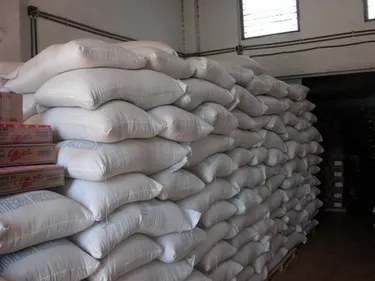
Unlike trading shares in a company or stocks for a finished product or market, the commodities market involves trading in raw materials, including those materials' future availability and trading prices. Commodity stocks bear the distinct hallmark of trading physical material instead of value and investment in a company or venture. Understanding how to buy and sell in the commodity market is a boon to novice and experienced investors alike. In addition, a basic comprehension of how futures interact with the commodity market can help you as you begin to invest.
Features of Commodity Markets
Video of the Day
While most commodity trades are settled for cash, it is very possible to purchase 3,000 bushels of wheat and end up having to find a place to store them. Of course, this can be problematic for the average investor. This feature of commodity trading led to onions being banned from futures trading in 1958, per US Code, Title 7, Chapter 1 and Section 13-1. Two men in Chicago cornered the onion stock market, stockpiling 14,000 tons of onions and manipulating the market to force onion farmers to buy back their own product. In addition, they sold onion futures they had bought previously to make significant profits at the cost of many producers and fellow traders.
Video of the Day
The writers for Iowa State University explain that due to regulations regarding raw material production and classifications in the commodities market, the producers must accept whatever price the market is willing to offer. This is referred to as the "fungibility" of commodities. Every bushel of number 2 corn, which has 15.5 percent moisture by definition, is interchangeable with any other bushel of number 2 corn.
This means traders don't care where they get their corn as long as they get the specified amount. The products can come from any number of farmers unless the producer has managed to distinguish their brand and product as distinctly and measurably different from peers. While producers with name-brand recognition influence the price at which their product is bought to a greater extent than other producers, they must be aware of their product's perceived value to optimize sales and costs. This is one of the key characteristics of commodity markets.
Commodity Futures Market
Futures are one of the characteristics of the commodity market. Essentially, futures are a contract agreeing to purchase a set amount of material to be delivered at a later date but paid for now. This allows producers to acquire funds now to be invested in improving their facilities or processes, while traders acquire an investment that can be sold for a profit when prices are higher as inflation and demand grow.
A 1993 study by the Organization for Economic Co-operation and Development states that the commodity market demonstrates much more volatility than the theory of efficient markets or competitive storage would support. Instead, at least in the short-run, commodity market behavior seems to be driven by individual traders' trading rules and strategies rather than market fundamentals.
This means that a sufficiently savvy and well-funded trader could replicate the Chicago onion futures market manipulation on a smaller or larger scale, though organizations like the Commodity Futures Trading Commission keep a keen eye on the market and commodity stocks to prevent such incidents. Commodity traders must be as aware of their fellow traders' actions and trends as they are of the consumer market's inclination, weather phenomena and transportation crises or boons. If you are considering investing in the commodities market, it makes sense to educate yourself, start slowly and seek help from a financial advisor if you have questions.
Consider also: How to Become a Commodity Trader
- Justia: 2001 US Code Title 7 - Agriculture Chapter 1 - COMMODITY EXCHANGES Sec. 13-1 - Violations, prohibition against dealings in onion futures; punishment
- Iowa State University: Commodities Versus Differentiated Products
- OECD: Commodity Price Variability
- Commodity Futures Trading Commission: Futures Glossary